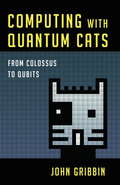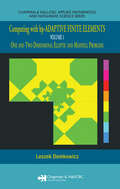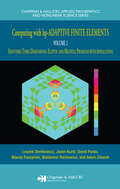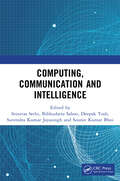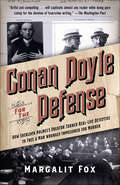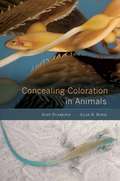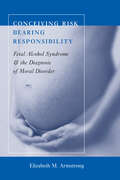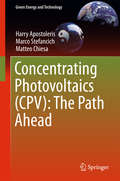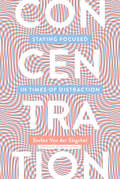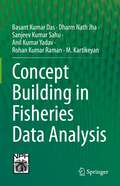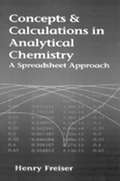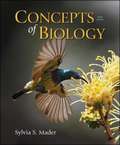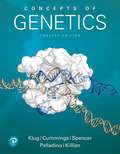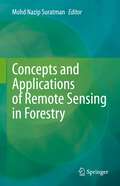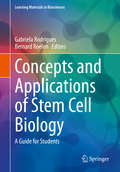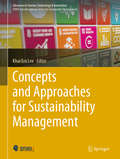- Table View
- List View
Computing with Quantum Cats
by John GribbinA mind-blowing glimpse into the near future, where quantum computing will have world-transforming effects.The quantum computer is no longer the stuff of science fiction. Pioneering physicists are on the brink of unlocking a new quantum universe which provides a better representation of reality than our everyday experiences and common sense ever could. The birth of quantum computers - which, like Schrödinger's famous "dead and alive" cat, rely on entities like electrons, photons, or atoms existing in two states at the same time - is set to turn the computing world on its head.In his fascinating study of this cutting-edge technology, John Gribbin updates his previous views on the nature of quantum reality, arguing for a universe of many parallel worlds where "everything is real." Looking back to Alan Turing's work on the Enigma machine and the first electronic computer, Gribbin explains how quantum theory developed to make quantum computers work in practice as well as in principle. He takes us beyond the arena of theoretical physics to explore their practical applications - from machines which learn through "intuition" and trial and error to unhackable laptops and smartphones. And he investigates the potential for this extraordinary science to create a world where communication occurs faster than light and teleportation is possible.This is an exciting insider's look at the new frontier of computer science and its revolutionary implications.
Computing with hp-ADAPTIVE FINITE ELEMENTS: Volume 1 One and Two Dimensional Elliptic and Maxwell Problems (Chapman & Hall/CRC Applied Mathematics & Nonlinear Science)
by Leszek DemkowiczOffering the only existing finite element (FE) codes for Maxwell equations that support hp refinements on irregular meshes, Computing with hp-ADAPTIVE FINITE ELEMENTS: Volume 1. One- and Two-Dimensional Elliptic and Maxwell Problems presents 1D and 2D codes and automatic hp adaptivity. This self-contained source discusses the theory and implementat
Computing with hp-ADAPTIVE FINITE ELEMENTS: Volume II Frontiers: Three Dimensional Elliptic and Maxwell Problems with Applications (Chapman & Hall/CRC Applied Mathematics & Nonlinear Science)
by David Pardo Leszek Demkowicz Maciej Paszynski Jason Kurtz Waldemar Rachowicz Adam ZdunekWith a focus on 1D and 2D problems, the first volume of Computing with hp-ADAPTIVE FINITE ELEMENTS prepared readers for the concepts and logic governing 3D code and implementation. Taking the next step in hp technology, Volume II Frontiers: Three-Dimensional Elliptic and Maxwell Problems with Applications presents the theoretical foundations of the
Computing, Communication and Intelligence
by Srinivas Sethi Bibhudatta Sahoo Deepak Tosh Suvendra Kumar Jayasingh Sourav Kumar BhoiThe International Conference on Cutting-edge Technology in Computing, Communications, and Intelligence- (ICCTCCI-2024) focuses on the application of smart technology and materials for smarter industrial production. The ICCTCCI-2024 provides common platform for presentation of original research findings, exchange of ideas and dissemination of innovative, practical development experiences in different aspects and fields of industry. It also focuses on the event organized with the objective of bringing together academicians, scientists, researchers from industry, research scholars, and students working in different industrial domains and applied applications.
Conan Doyle for the Defense: The True Story of a Sensational British Murder, a Quest for Justice, and the World's Most Famous Detective Writer
by Margalit FoxIn this thrilling true-crime procedural, the creator of Sherlock Holmes uses his unparalleled detective skills to exonerate a German Jew wrongly convicted of murder. <P><P>For all the scores of biographies of Arthur Conan Doyle, creator of the most famous detective in the world, there is no recent book that tells this remarkable story—in which Conan Doyle becomes a real-life detective on an actual murder case. In Conan Doyle for the Defense, Margalit Fox takes us step by step inside Conan Doyle’s investigative process and illuminates a murder mystery that is also a morality play for our time—a story of ethnic, religious, and anti-immigrant bias. In 1908, a wealthy woman was brutally murdered in her Glasgow home. The police found a convenient suspect in Oscar Slater—an immigrant Jewish cardsharp—who, despite his obvious innocence, was tried, convicted, and consigned to life at hard labor in a brutal Scottish prison. Conan Doyle, already world famous as the creator of Sherlock Holmes, was outraged by this injustice and became obsessed with the case. Using the methods of his most famous character, he scoured trial transcripts, newspaper accounts, and eyewitness statements, meticulously noting myriad holes, inconsistencies, and outright fabrications by police and prosecutors. Finally, in 1927, his work won Slater’s freedom.
Concealed
by Christina Diaz GonzalezThe 2022 Edgar Award Winner for Best Juvenile Mystery! <p><p>What if you had no name, no past, and no home? Ivette. Joanna. And now: Katrina Whatever her name is, it won't last long. Katrina doesn't know any of the details about her past, but she does know that she and her parents are part of the Witness Protection Program. Whenever her parents say they have to move on and start over, she takes on a new identity. A new name, a new hair color, a new story. Until their location leaks and her parents disappear. <p><p>Forced to embark on a dangerous rescue mission, Katrina and her new friend Parker set out to save her parents—and find out the truth about her secret past and the people that want her family dead. But every new discovery reveals that Katrina's entire life has been built around secrets covered up with lies and that her parents were actually the ones keeping the biggest secret of all. Katrina must now decide if learning the whole truth is worth the price of losing everything she has ever believed about herself and her family.
Concealed
by Christina Diaz GonzalezThe 2022 Edgar Award Winner for Best Juvenline Mystery! What if you had no name, no past, and no home?Ivette. Joanna. And now: KatrinaWhatever her name is, it won’t last long. Katrina doesn’t know any of the details about her past, but she does know that she and her parents are part of the Witness Protection Program. Whenever her parents say they have to move on and start over, she takes on a new identity. A new name, a new hair color, a new story.Until their location leaks and her parents disappear. Forced to embark on a dangerous rescue mission, Katrina and her new friend Parker set out to save her parents—and find out the truth about her secret past and the people that want her family dead.But every new discovery reveals that Katrina’s entire life has been built around secrets covered up with lies and that her parents were actually the ones keeping the biggest secret of all. Katrina must now decide if learning the whole truth is worth the price of losing everything she has ever believed about herself and her family.
Concealing Coloration in Animals
by Judy Diamond Alan B. BondThe biological functions of coloration in animals are sometimes surprising. Color can attract mates, intimidate enemies, and distract predators. But color patterns can also conceal animals from detection. Concealing coloration is unusual because it is an adaptation not only to the visual features of the environment but also to the perceptual and cognitive capabilities of other organisms. Judy Diamond and Alan Bond bring to light the many factors at work in the evolution of concealing coloration. Animals that resemble twigs, tree bark, stones, and seaweed may appear to be perfect imitations, but no concealment strategy is without flaws. Amid the clutter of the natural world, predators search for minute, telltale clues that will reveal the identity of their prey. Predators have remarkable abilities to learn to discriminate the fake from the real. But prey have their own range of defensive tactics, evolving multiple appearances or the ability to change color at will. Drawing on modern experimental evidence of the functional significance of animal color strategies, Diamond and Bond offer striking illustrations of how the evolution of features in one organism can be driven by the psychology of others. Concealing Coloration in Animals takes readers on a scientific adventure that explores creatures inside mats of floating seaweed, mice and lizards on desert rocks and sand, and rare parrots in the rainforest of New Zealand. Color photographs extensively document the mind-boggling array of deceptive strategies animals use to blend in, mislead, or vanish from view.
Conceiving Risk, Bearing Responsibility: Fetal Alcohol Syndrome and the Diagnosis of Moral Disorder
by Elizabeth M. ArmstrongIn American society, the consumption of alcohol during pregnancy is considered dangerous, irresponsible, and in some cases illegal. Pregnant women who have even a single drink routinely face openly voiced reproach. Yet fetal alcohol syndrome (FAS) in infants and children is notoriously difficult to diagnose, and the relationship between alcohol and adverse birth outcomes is riddled with puzzles and paradoxes. Sociologist Elizabeth M. Armstrong uses fetal alcohol syndrome and the problem of drinking during pregnancy to examine the assumed relationship between somatic and social disorder, the ways in which social problems are individualized, and the intertwining of health and morality that characterizes American society. She traces the evolution of medical knowledge about the effects of alcohol on fetal development, from nineteenth-century debates about drinking and heredity to the modern diagnosis of FAS and its kindred syndromes. She argues that issues of race, class, and gender have influenced medical findings about alcohol and reproduction and that these findings have always reflected broader social and moral preoccupations and, in particular, concerns about women's roles and place in society, as well as the fitness of future generations. Medical beliefs about drinking during pregnancy have often ignored the poverty, chaos, and insufficiency of some women's lives—factors that may be more responsible than alcohol for adverse outcomes in babies and children. Using primary sources and interviews to explore relationships between doctors and patients and women and their unborn children, Armstrong offers a provocative and detailed analysis of how drinking during pregnancy came to be considered a pervasive social problem, despite the uncertainties surrounding the epidemiology and etiology of fetal alcohol syndrome.
Concentrated Emulsion Polymerization
by Eli Ruckenstein Hangquan Li Chong ChengComprising one volume of Functional and Modified Polymeric Materials, Two-Volume Set, this curated collection of papers by Professor Eli Ruckenstein and co-workers discusses the merits of concentrated emulsion polymerization systems, as well as their ability to yield a broad variety of products with high synthetic efficiency. Comprised of carefully curated chapters previously published by these pioneering scientists in the field, this volume offers a comprehensive view of the subject and presents functional and modified polymeric materials prepared by concentrated emulsion polymerization approaches. It covers conductive polymer composites, core-shell latex particles, enzyme/catalyst carriers, and plastics toughening and compatibilization polymerization. The authors have performed seminal studies on the preparation of functional and modified polymeric materials via concentrated emulsion polymerization. The corresponding research papers, after further selection and classification, are collected in the four chapters of this book.
Concentrated Solar Power Systems
by D. P. Kothari Bellamkonda PragathiFollow the performance assessment tools and methods currently used for concentrated solar power technology (CSP) in this unique, single source overview The search for renewable energy sources and methods for harnessing them is perhaps the most significant challenge of the twenty first century, which faces the potentially existential crises of global climate change. Concentrated solar power, or CSP, has the potential to revolutionize energy production. Its integration of thermal energy and its capacity to work with traditional power generation cycles make it an ideal tool for a newly sustainable world. Concentrated Solar Power Systems is an advanced-level book offering both theoretical and practical perspectives on CSP. Its thorough overview of this technology includes the foundational scientific principles, system design and development, and growing applications. It offers a one-stop source for the performance assessment tools and methods currently deployed in the area of concentrated solar power. Readers will also find: Case studies throughout showing CSP harnessed to meet real energy needs Detailed discussion of topics including site selection, feasibility analysis, environmental assessments, and more Analysis of specific technologies including linear Fresnel reflectors, parabolic troughs, concentrating photovoltaic systems, and many others Concentrated Solar Power Systems is ideal for students and researchers involved or interested in the design, production, development, optimization, and application of CSP technology.
Concentrated Solar Thermal Energy Technologies: Recent Trends and Applications (Springer Proceedings in Energy)
by Laltu Chandra Ambesh DixitThe proceedings entitled "Concentrated Solar Thermal Technologies: Recent Trends and Applications" includes the peer-reviewed selected papers those are presented during NCSTET 2016. The sub-topics under concentrated solar thermal technologies and applications included in the book are Solar Field; Receiver and Heat Exchanger; Coating; Thermal Energy Storage; Cooling; Process Heat; and Smart Grid and Policy Research. The domains mentioned cover topics from resource-assessment, collection to conversion of solar energy for applications, like, heating, cooling and electricity. The proceedings also include invited lectures from domain experts. The edited work will be useful for beginners and for the advanced level researchers in the field of concentrated solar thermal technologies and their applications.
Concentrating Photovoltaics (Green Energy and Technology)
by Harry Apostoleris Marco Stefancich Matteo ChiesaThis book is a concise review of the current status and future prospects of concentrating photovoltaic (CPV) technology. Starting with a summary of the current technical and economic status of CPV technology, it identifies the factors that hold CPV back in the commercial market. The main technical areas considered are solar cells, tracking and optics. The solar cells section focuses on spectrum splitting systems, which offer potentially higher efficiency than multi-junction cells with reductions in the manufacturing constraints that lead to high costs. It also offers a brief survey of the latest developments in spectral splitting alongside a discussion of the advances in solar cell manufacturing that aid the development of such systems. Further, it examines electrical design principles for spectral splitting systems that can improve the spectral stability of these systems' performance. The section on tracking includes a description of tracking integration with an update of the review published in Nature, presenting the latest advances in the field and focusing on surveying conceptual approaches rather than providing an exhaustive description of the literature. The optics section explores 3D printing and other emerging methods of fabricating optics for both prototype and large-scale production, as well as new classes of concentrators, particularly those based on novel photonic materials such as angular filters. Lastly, the authors consider the impact that environmental factors have on the performance of CPV in non-standard environments before concluding with a discussion of the combinations of technologies that they anticipate will most effectively boost CPV in the commercial market.
Concentrating Solar Thermal Energy: Fundamentals and Applications
by Gilles FlamantThe Sun, our star, has inspired the research of many scientists and engineers and brings hope to many of us for a paradigm shift in energy. Indeed, the applications of solar energy are manifold, primarily because it concerns both light and heat. Photovoltaic (PV) conversion is the most well-known among these, but other modes of conversion include photochemical, photobiological, photoelectrochemical, thermal and thermochemical.This book covers the entire chain of conversion from the Sun to the targeted energy vector (heat, electricity, gaseous or liquid fuels). Beginning with the state of the art, subsequent chapters address solar resources, concentration and capture technologies, the science of flows and transfers in solar receivers, materials with controlled optical properties, thermal storage, hybrid systems (PV-thermal) and synthetic fuels (hydrogen and synthetic gas).Written by a number of experts in the field, Concentrating Solar Thermal Energy provides an insightful overview of the current landscape of the knowledge regarding the most recent applications of concentrating technologies.
Concentrating Solar Thermal Technologies: Analysis and Optimisation by CFD Modelling (Green Energy and Technology)
by Maria Isabel Roldán SerranoThis book addresses the evaluation and optimization of key elements in concentrating solar thermal (CST) technologies, such as solar receivers and working fluids, using computational fluid dynamics (CFD) modeling. It discusses both general and specific aspects, explaining the methodology used to analyze and evaluate the influence of different parameters on the facility performance. This information provides the basis for optimizing design and operating conditions in CST systems.
Concentration: Staying Focused in Times of Distraction
by Stefan Van Der StigchelHow to concentrate in a world of beeping smartphones, channel surfing, live-tweeting, pop-up ads, and other distractions.We are in the midst of an attention crisis—caused in large part by our smartphones. There's a constant stream of information that we are powerless to withstand because it shows up in our notifications. More and more of us are finding it harder and harder to concentrate. In this book, attention expert and cognitive psychologist Stefan Van der Stigchel explains how concentration works and offers advice on how to stay focused in a world of beeping smartphones, channel surfing, live-tweeting, pop-up ads, and other distractions.The good news, Van der Stigchel reports, is that we now know more about brain and behavior than ever before, and he draws on the latest scientific findings in his account of concentration. He explains, among other things, that the battle for our attention began long before the digital era; why our phones are so addictive; the importance of working memory (responsible for executing complicated tasks) and how to increase its capacity; and why multitasking is bad for our concentration, but attention rituals help it. He describes the 2017 Oscars debacle (when the Best Picture presenter was given the wrong card) as a failure of multitasking; argues that daydreaming can be good for our concentration; and shows that the presence of a passenger in a car reduces the risk of an accident. He explains the positive effects of taking “tech breaks” (particularly in natural surroundings), meditation, and even daydreaming. We can win the battle for our attention, Van der Stigchel argues, if we have the knowledge and the tools to do it.
Concept Building in Fisheries Data Analysis
by Basant Kumar Das Dharm Nath Jha Sanjeev Kumar Sahu Anil Kumar Yadav Rohan Kumar Raman M. KartikeyanThis authored book is primarily for the readers who are in search of how to use basic concepts of statistics in the field of fishery science. It has been written for the new comers coming in the fishery sector including university students, teachers and research scholars. It enriches the reader’s knowledge of data analysis step by step starting from data collection to its analysis and interpretation along with practical application with real example. It supports readers for enhancing theoretical and practical concept of application of fundamental statistics in fishery domain. Reader may also learn how to analyses data using different statistical software. Each chapter starts with an introduction of the topic followed by statistical concept with example and ends with chapter based question for comprehension purpose. This book is of interest to teachers, researchers, scientists, capacity builders in fishery sciences. Also the book serves as additional reading material for undergraduate and graduate students of fisheries and aquatic sciences.
Concept Development Studies in Chemistry
by John S. HutchinsonConcept Development Studies in Chemistry is a textbook for an Introductory General Chemistry course. Each module develops a central concept in Chemistry from experimental observations and inductive reasoning. This approach complements an interactive or active learning teaching approach.
Conceptions of Set and the Foundations of Mathematics
by Luca IncurvatiSets are central to mathematics and its foundations, but what are they? In this book Luca Incurvati provides a detailed examination of all the major conceptions of set and discusses their virtues and shortcomings, as well as introducing the fundamentals of the alternative set theories with which these conceptions are associated. He shows that the conceptual landscape includes not only the naïve and iterative conceptions but also the limitation of size conception, the definite conception, the stratified conception and the graph conception. In addition, he presents a novel, minimalist account of the iterative conception which does not require the existence of a relation of metaphysical dependence between a set and its members. His book will be of interest to researchers and advanced students in logic and the philosophy of mathematics.
Concepts & Calculations in Analytical Chemistry, Featuring the Use of Excel
by Henry Freiser Monika FreiserConcepts & Calculations in Analytical Chemistry: A Spreadsheet Approach offers a novel approach to learning the fundamentals of chemical equilibria using the flexibility and power of a spreadsheet program. Through a conceptual presentation of chemical principles, this text will allow the reader to produce and digest large assemblies of numerical data/calculations while still focusing on the chemistry.
Concepts Of Biology
by Sylvia MaderConcepts of Biology 3e recognizes the value of the traditional approach while still engaging students in the excitement of relevancy to themselves and the world around them. The text abounds with analogies and engaging illustrations as it proceeds from an examination of chemistry to the biosphere. A significant new feature of this edition is the integration of media asset into the chapter content. Virtually every section of the textbook is now linked to MP3 files, 3D and 2D animations of biological processes, and National Geographic and ScienCentral videos. In addition, McGraw-Hill offers a full suite of adaptive learning tools including LearnSmart, LearnSmart Labs, LearnSmart Prep, LearnSmart Achieve, and SmartBook, all designed to assess a student’s existing knowledge base and adapt to particularly address deficiencies.
Concepts Of Genetics
by Michael Cummings Charlotte Spencer Darrell Killian William Klug Michael PalladinoConcepts of Genetics emphasizes the fundamental ideas of genetics, while exploring modern techniques and applications of genetic analysis. This best-selling text continues to provide understandable explanations of complex, analytical topics and recognizes the importance of teaching students how to become effective problem solvers. <p><p> The 12th Edition has been extensively updated to provide comprehensive coverage of important, emerging topics such as CRISPR-Cas and the study of posttranscriptional gene regulation in eukaryotes. An expanded emphasis on ethical considerations that genetics is bringing into everyday life is addressed in Genetics, Ethics, and Society and Case Study features. The accompanying Mastering™ Genetics online platform is updated with new tutorials and Dynamic Study Modules.
Concepts and Applications of Remote Sensing in Forestry
by Mohd Nazip SuratmanThis edited book is a collection of information on recent advancements in remote sensing for forestry application. The main focus of this book is to address the novel applications in remote sensing in terms of recent techniques, sensors, methods and data collection. Remote sensing has been used for many decades. Today, remote sensing is heavily utilized in forest management, which is acquired from airborne and space-borne platforms using satellite data. In recent years, there have been rapid advances in the new types of sensors. The new generations of satellite sensors are introduced not only to provide important information on forest ecosystems, but also to improve the techniques and accuracies obtained by the traditional approaches. Researchers have become increasingly aware of the potential of remote sensing to address important forestry issues and challenges. The number of forestry publications using remote sensing has grown very rapidly, and this is noticeable with many recent technologies and applications. This book provides valuable source of reference to foresters, researchers, ecologists, climate change scientists and scholars who use remote sensing in their work. Furthermore, it serves as an academic book for undergraduate and graduate students of forestry, agriculture, natural resources and environmental sciences. The book demonstrates and engages the students how the new advancements in remote sensing technology and theory relate to the many real-world forestry applications. It gives readers deeper understanding on how remote sensing has come a long way and evolved into a mature science in the past five decades.
Concepts and Applications of Stem Cell Biology: A Guide for Students (Learning Materials in Biosciences)
by Gabriela Rodrigues Bernard A. J. RoelenThis textbook will support graduate students with learning materials rich in the basic concepts of stem cell biology, in its most widespread and updated perspective. The chapters are conceived in a way for students to understand the meaning of pluripotency, the definition of embryonic stem cells and the formation of multicellular structures such as organoids together with the underlying principles of their epigenetic. This textbook also discusses adult stem cells and the potential use of these cells, in particular neural, mesenchymal, and several types of muscular cells, in biomedical research and clinical applications.This textbook represents a vital complement to the text on Essential Current Concepts of Stem Cell Biology, also published in the Learning Materials in Biosciences textbook series.
Concepts and Approaches for Sustainability Management (Advances in Science, Technology & Innovation)
by Khai Ern LeeWith the introduction of the 2030 Agenda for Sustainable Development by the United Nations General Assembly in 25 September 2015, UN agencies, member states and stakeholders have begun to focus on the adoption and implementation of these strategies in realization of 17 Sustainable Development Goals. To work toward sustainability, strategic measures to encourage stakeholders to contribute to the goals of the 2030 agenda are needed. In recognition of these efforts, this book is produced to compile research concepts and approaches for the area of sustainability management of industry, technology development, community, education and the environment. The objective of this book is to deliberate concepts and approaches of sustainability management taking place in Malaysia whereby case studies will be revealed to provide way forward of sustainability management toward achieving sustainable development. The insights provided can be applied to advanced and developing countries by sustainable development practitioners, encompassing government agencies, academia, industries, NGOs and community, who would like to adopt the concept of approach of sustainability into their area of management.
